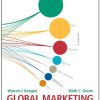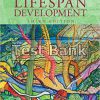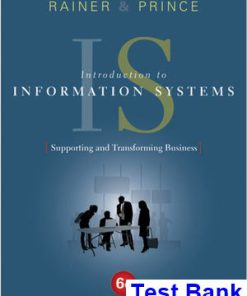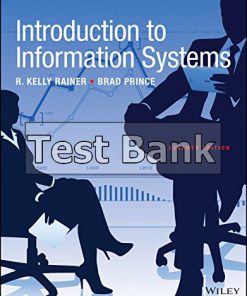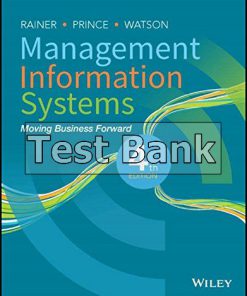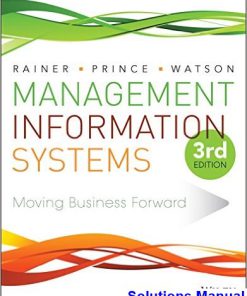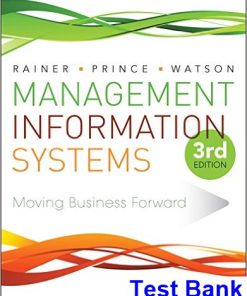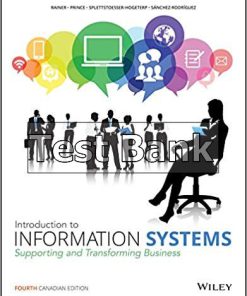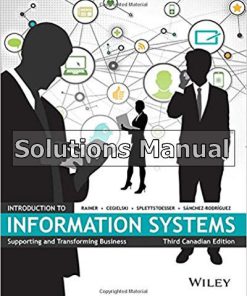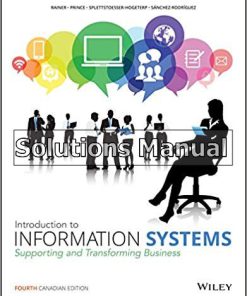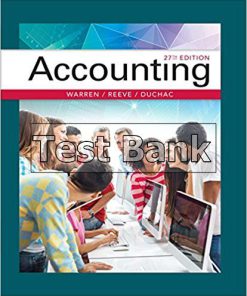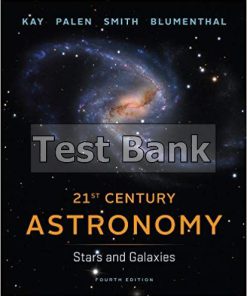Introduction to Information Systems Canadian 3rd Edition Rainer Test Bank
$50.00 Original price was: $50.00.$26.50Current price is: $26.50.
Introduction to Information Systems Canadian 3rd Edition Rainer Test Bank.
Introduction to Information Systems Canadian 3rd Edition Rainer Test Bank
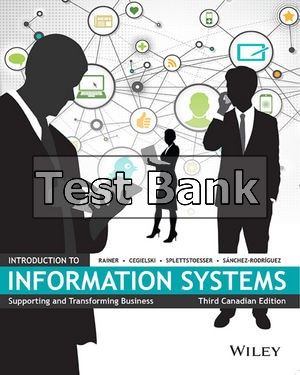
Product details:
- ISBN-10 : 1118476999
- ISBN-13 : 978-1118476994
- Author: R. Kelly Rainer, Casey G. Cegielski, Ingrid Splettstoesser-Hogeterp, Cristobal Sanchez-Rodriguez
The goal of Introduction to Information Systems, 3rd Canadian Edition remains the same: to teach all business majors, especially undergraduate ones, how to use information technology to master their current or future jobs and to help ensure the success of their organization. To accomplish this goal, this text helps students to become informed users; that is, persons knowledgeable about information systems and information technology. The focus is not on merely learning the concepts of IT but rather on applying those concepts to facilitate business processes. The authors concentrate on placing information systems in the context of business, so that students will more readily grasp the concepts presented in the text. The theme of this book is What’s In IT for Me? This question is asked by all students who take this course. The book will show you that IT is the backbone of any business, whether a student is majoring in Accounting, Finance, Marketing, Human Resources, or Production/Operations Management. Information for the Management Information Systems (MIS) major is also included.
Table contents:
Chapter 1 Introduction to Information Systems
1.1: Why Should I Study Information Systems?
1.2: Overview of Computer-Based Information Systems
1.3: How Does IT Impact Organizations?
1.4: Importance of Information Systems to Society
Chapter 2 Organizational Strategy, Competitive Advantage, and Information Systems
2.1: Business Processes
2.2: Business Process Improvement, Business Process Reengineering, and Business Process Management
2.3: Business Pressures, Organizational Responses, and Information Technology Support
2.4: Competitive Advantage and Strategic Information Systems
2.5: Business–Information Technology Alignment
Chapter 3 Data and Knowledge Management
3.1: Managing Data
3.2: The Database Approach
3.3: Database Management Systems
3.4: Data Warehouses and Data Marts
3.5: Knowledge Management
Chapter 4 Networks
4.1: What Is a Computer Network?
4.2: Network Fundamentals
4.3: The Internet and the World Wide Web
4.4: Internet Network Applications
4.5: E-Learning and Distance Learning
Chapter 5 E-Business and E-Commerce
5.1: Overview of E-Business and E-Commerce
5.2: Business-to-Consumer (B2C) Electronic Commerce
5.3: Business-to-Business (B2B) Electronic Commerce
5.4: Electronic Payments
5.5: Ethical and Legal Issues in E-Business
Chapter 6 Wireless, Mobile Computing, and Mobile Commerce
6.1: Wireless Technologies
6.2: Wireless Computer Networks and Internet Access
6.3: Mobile Computing and Mobile Commerce
6.4: Pervasive Computing
6.5: Wireless Security Issues
Chapter 7 Social Computing
7.1: Web 2.0
7.2: Fundamentals of Social Computing in Business
7.3: Social Computing in Business: Shopping
7.4: Social Computing in Business: Marketing
7.5: Social Computing in Business: Customer Relationship Management
7.6: Social Computing in Business: Human Resource Management
Chapter 8 Information Systems within the Organization
8.1: Transaction Processing Systems
8.2: Functional Area Information Systems
8.3: Enterprise Resource Planning Systems
8.4: ERP Support for Business Processes
8.5: Reports
Chapter 9 Customer Relationship Management and Supply Chain Management
9.1: Defining Customer Relationship Management
9.2: Operational Customer Relationship Management Systems
9.3: Analytical Customer Relationship Management Systems
9.4: Other Types of Customer Relationship Management Systems
9.5: Supply Chains
9.6: Supply Chain Management
9.7: Information Technology Support for Supply Chain Management
Chapter 10 Business Intelligence
10.1: Managers and Decision Making
10.2: What Is Business Intelligence?
10.3: Business Intelligence Applications for Data Analysis
10.4: Business Intelligence Applications for Presenting Results
10.5: Business Intelligence in Action: Corporate Performance Management
Chapter 11 Acquiring Information Systems and Applications
11.1: Planning for and Justifying IT Applications
11.2: Strategies for Acquiring IT Applications
11.3: The Traditional Systems Development Life Cycle
11.4: Alternative Methods and Tools for Systems Development
11.5: Vendor and Software Selection
Chapter 12 Ethics and Privacy
12.1: Ethical Issues
12.2: Privacy
Chapter 13 Information Security and Controls
13.1: Introduction to Information Security
13.2: Unintentional Threats to Information Systems
13.3: Deliberate Threats to Information Systems
13.4: What Organizations Are Doing to Protect Information Resources
13.5: Information Security Controls
Technology Guide 1 Hardware
TG 1.1: Introduction
TG 1.2: Strategic Hardware Issues
TG 1.3: Computer Hierarchy
TG 1.4: Input and Output Technologies
TG 1.5: The Central Processing Unit
TG 1.6: Computer Memory
Technology Guide 2 Software
TG 2.1: Introduction
TG 2.2: Software Issues
TG 2.3: Systems Software
TG 2.4: Application Software
Technology Guide 3 Cloud Computing
TG 3.1: Introduction
TG 3.2: What Is Cloud Computing?
TG 3.3: Different Types of Clouds
TG 3.4: Cloud Computing Services
TG 3.5: The Benefits of Cloud Computing
TG 3.6: Concerns and Risks with Cloud Computing
TG 3.7: Web Services and Service-Oriented Architecture
Technology Guide 4 Intelligent Systems
TG 4.1: Introduction
TG 4.2: Expert Systems
TG 4.3: Neural Networks
TG 4.4: Fuzzy Logic
TG 4.5: Genetic Algorithms
TG 4.6: Intelligent Agents
Technology Guide 5 Protecting Your Information Assets
TG 5.1: Introduction
TG 5.2: Behavioral Actions to Protect Your Information Assets
TG 5.3: Computer-Based Actions to Protect Your Information Assets
People also search:
introduction to information systems canadian 3rd
introduction to information systems 3rd edition
introduction to computing systems 3rd edition pdf download
introduction to computing systems 3rd edition free pdf
an introduction to information security
Instant download after Payment is complete
You may also like…
Information Technology
Introduction to Information Systems 6th Edition Rainer Test Bank
Information Technology
Introduction to Information Systems 6th Edition Rainer Solutions Manual
Related products
Test Bank


